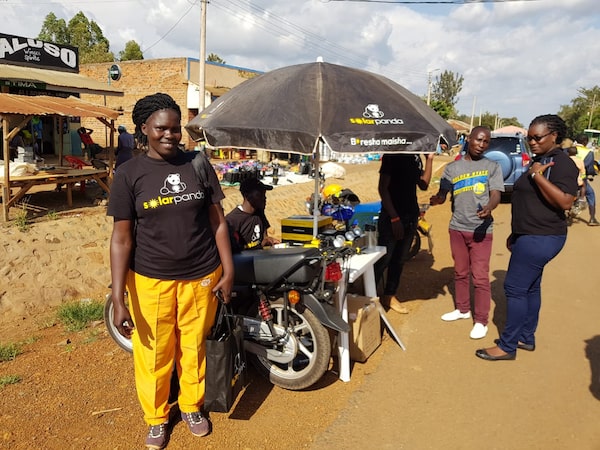
Andy Keith (front) in Kenya for Solar Panda employee training day, in a handout photo.Handout
As Andy Keith listened to a panel of experts discuss off-grid solar energy at a San Francisco tech conference in 2016, one bleak statistic left the serial entrepreneur particularly dismayed.
“They said that one billion people in the world still had no access to electricity, and that a large number of them lived in Africa,” Mr. Keith said.
That massive number, now estimated at 940 million, spurred Mr. Keith to take action. The then-30-year-old had wanted to make a difference in the continent since visiting Ghana in 2005 as a volunteer math teacher and noticing that many households lived without electricity.
He came back to Toronto wanting to power more of the world’s homes, and that goal led him to build and sell two solar-energy-generation companies in Canada over the next decade. By 2016, he had raised enough capital to return to Africa and bring about change.
“So many people still without electricity was both a travesty that needed attention and a huge business opportunity, given the fallen cost of solar energy,” he said. “The goal became to provide more African homes with off grid solar energy.”
In August of 2016, just seven months after that conference, he invested his own money to create and incorporate Solar Panda, a Canadian company that provides small, affordable solar-energy systems to homes across Kenya that do not have access to the local electrical grid.
In small daily installments, Kenyan homeowners can purchase a basic power unit that comes with four lamps, a lantern and a radio, or larger units that also come with more lamps, a cellphone charger and a 32-inch television.

One of Solar Panda's marketing standing in Kenya.Handout
In its six years of existence, the company has grown to serve an estimated million people across 200,000 households in the country, and now employs more than 1,000 people.
“We grew very quickly,” Mr. Keith said, ”because the need for this is at least twofold: residents needed to light their homes in a more affordable way, but also in a healthier way.”
Many Kenyan households without access to the power grid use kerosene lamps, whose fumes can cause skin and eye irritation and, when breathed in, could cause as much damage to the lungs as smoking two packs of cigarettes a day. The lamps are also a poison hazard for children, and emit a consistent stream of greenhouse gas into the atmosphere. Yet, they are affordable: a litre of kerosene costs about a dollar, and households typically burn through five litres per week.
Solar Panda’s power packs come at a competitive rate: clients can purchase them in daily installments of 50 U.S. cents over a period of 15 months, which amounts to roughly US$250. It’s no small expense – Mr. Keith compares it with a Canadian leasing a car – but in many cases is cheaper than connecting to the Kenyan power grid, which can amount to $400 or more the farther one moves from city centres.
Asking struggling households for daily payments may not feel intuitive, but Mr. Keith is convinced that the added revenue will help his company attract more investors, create more local jobs, power more homes, and eventually pull an increasing number of households out of darkness and poverty.
Plus, Mr. Keith said, a for-profit company can scale up and be self-sufficient, and can avoid the uncertainty of grants and social-impact funding.
“Africa needs to be seen as a peer for trade, and needs investment and job opportunities more than aid and volunteers,” said Mr. Keith, who raised $8-million in Series A venture-capital funding in June, and is now looking to accrue even more in Series B financing.
Salome Aluoch, a mother of two, bought a basic power pack in 2018. She had wanted to ditch the kerosene lamps for their negative health effects sooner, but the costs of connecting to the country’s power grid from her home in Gem, a village in Siaya County, 400 kilometres northwest from Nairobi, were prohibitive. But she needed light in her home to cook, read and help her children with their homework at night. When she heard about Solar Panda’s healthier, similarly priced light setup, she bought it immediately.
“The home kits have really helped a lot,” she said. “The country’s electricity grid is so expensive if you live far away from the city centres. People in rural Kenya needed a company like this to come and help.”
Antony Makau, a Nairobi native and Solar Panda’s manager of client customer care, said locals take advantage of the power packs for more than cooking and reading: Business people use them to extend their workdays and sell at night, fishermen are able to fish after the sun goes down, all without the fear of inhaling harmful fumes.
“Our motto is kubadilisha maisha: transform life, because we do so with people who can use the packs, and others who find work with us,” Mr. Makau said. “I feel like it has changed the lives of many for the better.”
Mr. Keith, meanwhile, has his eyes on future growth: He says the company hopes to take on larger-scale solar projects in Kenya, but also is looking to expand to other countries in need of affordable electricity, such as Zambia, Malawi and Nigeria. His grand goal is to further popularize it in the fastest-growing continent on Earth, as solar energy becomes cheaper and more popular worldwide.
“A big question in climate change is: How will Africa be electrified?” Mr. Keith said. “If we expose millions of people to solar energy, it becomes part of the culture, our next generation grows up healthier, and our planet also benefits.”

Seated is the first Solar Panda customer in Kenya.Handout